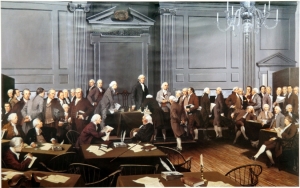As many of the nations involved in the Arab Spring struggle to establish governments, we perceive them to be mired in chaos and tend to judge them harshly.
But not so fast. The United States in its infancy also struggled. Under the Articles of Confederation and Perpetual Union, the precursor to the U.S. Constitution, the government did not have the right to raise revenues so it could not pay its bills. In fact it defaulted on most of its debts. It could not pay its army. It could not bring errant states back in line, making it a struggle to establish validity as a nation before foreign governments.
The Confederate Congress could make decisions, but it could not enforce them. And implementing decisions required unanimous approval by all 13 states. Congress could print money, but it was worthless. Congress could borrow money, but it could not pay it back. No interest was paid on debt owed to foreign governments and by 1786, a mere five years after ratification, it was defaulting on those debts as they became due. Spain closed New Orleans to American commerce.
Something needed to change before the vision of a representational government faded—or fell apart—completely. Most state delegates agreed that an “effective central government with a wide range of enforceable powers” was needed. “All agreed to a republican form of government grounded in representing the people in the states.”
In 1787, the Articles of Confederation were reexamined and in only four months birthed the U.S. Constitution. A handwritten document five pages long established the governance of the United States of America. Can you imagine in our political climate something so miraculous happening so quickly?
While not unanimously approved, it was a great compromise. In the words of Benjamin Franklin, one of 39 signers of the constitution: “There are several parts of this Constitution which I do not at present approve, but I am not sure I shall never approve them.” He would accept the Constitution, “because I expect no better and because I am not sure that it is not the best.” In the end, it was approved by all that remained: eleven state delegations and the lone delegate from New York. Enacted in 1788, it was ratified by ten of the 13 states (nine were required for enactment). Ultimately it was ratified by all 13 states in 1790.
“Since the Constitution came into force in 1789, it has been amended twenty-seven times. In general, the first ten amendments, known collectively as the Bill of Rights, offer specific protections of individual liberty and justice and place restrictions on the powers of government. [These were added to the Constitution in 1791.] The majority of the seventeen later amendments expand individual civil rights. Others address issues related to federal authority or modify government processes and procedures. Amendments to the United States Constitution, unlike ones made to many constitutions world-wide, are appended to the end of the document. At seven articles and twenty-seven amendments, it is the shortest written constitution in force.
“The Constitution is interpreted, supplemented, and implemented by a large body of constitutional law. The Constitution of the United States is the first constitution of its kind, and has influenced the constitutions of other nations.” [Source: Wikipedia] As Benjamin Franklin prophesied, the Constitution is not perfect and there are differing interpretations of its intent. It is viewed by some as a living document requiring adjustment as culture and times change, and by others (ahem, Justice Scalia) in only the strictest sense as it was written in the 18th century. It has taken 227 years to get to this point, and amendments are still likely to be considered on into the future.
The countries around the globe that are struggling to create new governing bodies and law under the duress of violence and clashing cultures deserve the time to envision the government that can embody stability for their people. Impatience on our part is impertinent, unrealistic and undeserved.

